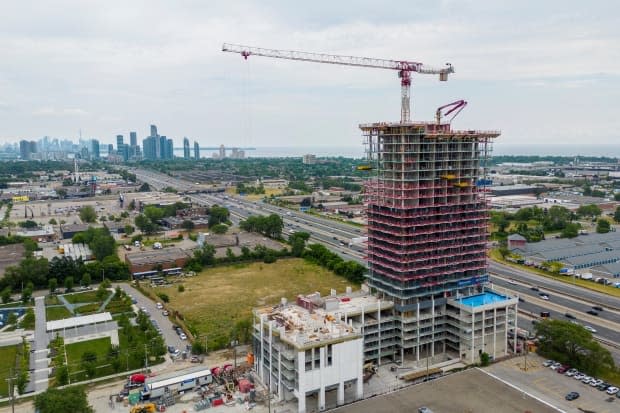Drop appeal against Toronto affordable housing bylaw, advocates tell developers

Housing advocates are calling on a group of developers to drop their appeal of a new city bylaw they say was established to protect tenants and ensure more affordable housing is built in Toronto.
The group, called the Toronto Community Benefits Network, spoke at city hall Thursday about the appeal to be heard at the Ontario Land Tribunal. At the centre of the case is a key piece of the City of Toronto's Planning Act and changes city council made to it earlier this year.
"We need to make sure that all of Toronto can afford to live here," said Rosemarie Powell, the executive director of the network, who stressed keeping the current system in place will push people out of their homes and into poverty."
The changes council made redefine how "affordability" is determined in new developments. That definition has a direct impact on how developers qualify for municipal incentives related to building affordable housing.
The group alleges the developers are trying to hold onto an older, more lucrative way of determining how they qualify for the incentives, rather than a new bylaw that helps tenants.
The current city definition of affordable housing uses median rent charged in the market to set those incentive standards. The new standard adopted by city council changes that measure to the income of the average Torontonian. It essentially says for housing to be deemed affordable to tenants, they must pay "no more than 30 per cent of their gross income in rent."
Powell said the difference in the cost of rent between the two measures can be as much as 50 per cent. The appeal has paused progress on that change, and could endanger it, she added.

Minto (Mimico) Inc., Greenwin Holding Inc., Double Z Investments Inc., Policy Investment Ltd. are among the appellants listed in Ontario Land Tribunal documents obtained by CBC Toronto. A lawyer listed as counsel for the group of developers did not immediately respond to a request for comment.
The case will go before the Ontario Land Tribunal on Friday, but will largely be heard during 10 days of scheduled sessions starting in July 2023.
Appeal 'unconscionable,' advocate says
The impact of keeping the status quo is that units will be built, labelled as affordable housing, but would be unaffordable to the average Toronto resident, Powell said.
"It's unconscionable to think that developers can determine what residents are able to pay for their rent," she said. "Affordability ought to be determined by those who are actually going to be paying for it."
Walied Khogali Ali, of the Regent Park Neighbourhood Association, said the development community must work with community residents' groups to help ensure affordable housing is available across the city.
"They're making enough money right now, this is about greed," he said. "This is not about what's in the best interest of the public, of the people."
Serena Purdy, of the Friends of Kensington Market, said the City of Toronto held an extensive consultation process last year before council voted to make the change.
"This definition results from democratic processes designed to protect everyone's interests and needs not just developers massive profits," she said.
The advocate groups say the City of Toronto has indicated it will defend the bylaw at the tribunal. A lawyer for the city said at a September hearing into the matter that the bylaw change "is a very important policy for the city and is directly tied to provincial interests."


